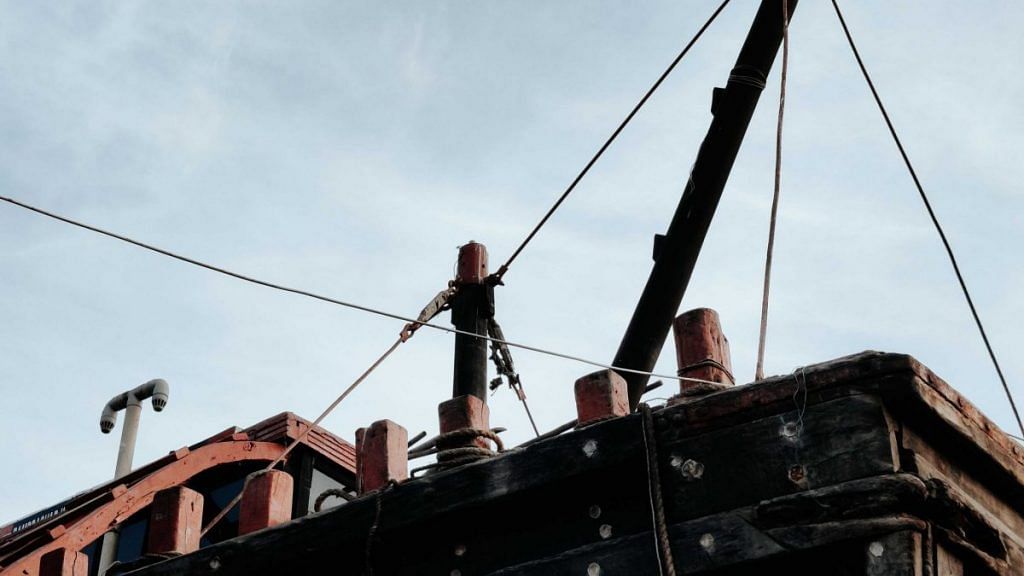Porbandar: Gujarati businessman Vinod Masani and his brother Hiralal bought a boat in the early 2000s and christened it ‘Kuber’ on the advice of a Brahmin priest, after the Hindu god of good fortune and money. But the trawler got Masani anything but riches. The Kuber is linked to Masani much like an albatross around his neck. He can neither use it nor get rid of it because of court orders to not destroy or sell it given that it was part of the evidence in Ajmal Amir Kasab’s trial.
Ten years have passed since Kasab was hanged, but Masani is still unable to sail the boat that the Lashkar-e-Taiba operative and eight other terrorists hijacked to orchestrate the 26/11 attacks in Mumbai.
About 15ft tall and 52ft long, its once white coat of paint now gone, the Kuber occupies a corner in Gujarat’s Porbandar harbour, standing out from the hundreds of other boats that have been docked ahead of the monsoon. It still sends shudders down the spine of anyone who passes it. “Isne meri life barbaad kardi (It has destroyed my life),” cries Masani.
He used to own 20 trawlers, but now has only five boats docked in Porbandar harbour. One of them is the Kuber. “Currently, 15 of my boats worth Rs 5 crore are in Pakistan, seized by the authorities. We used to be very well-to-do. Today, we have nothing.”
The passage of time has not been kind to Masani who looks much older than his 54 years. A stroke in 2014 left him paralysed, his speech slurred, and his memory in tatters. “Look at me today; look at the way I slur and talk. It’s the stroke due to immense tension and stress that caused this.”
Also Read: ‘Grandfather wrong about Modi’ — A day in Iltija Mufti’s life, PDP dynast with voice & vlog
The ‘terror’ boat
On 14 November 2006, two of Masani’s boats, MV Kuber and MV Maa, set sail together on a fishing expedition. MV Maa returned on 25 November without the Kuber. Crew members of Maa said they had been separated from the Kuber due to a storm. Masani waited till 27 November to inform the authorities that the boat was lost since it’s common for trawlers to be delayed at sea.
While watching the attacks unfold on his television screen, Masani got a call from Mumbai. Authorities had found the boat Kasab and company had used and traced it back to him. The investigation later revealed that it had been hijacked a few days before the 26/11 attacks somewhere between Porbandar and Jakhau.
When they hijacked the Kuber, the terrorists killed all the crew. They were presumably thrown off the boat because the bodies were never found. The captain of the crew was forced to steer the ship all the way to Mumbai before he was killed. His body was later found by the Navy.
In a rather ironic twist of events, Masani got his boat back in record time. A special court released the boat just three months after the terror attack, saying that its owner’s livelihood would be harmed if it was not returned to him.
But the Kuber never set sail again. Nobody wanted to be on the ‘terror boat’. Between 2009-12, even when Masani tried to take the trawler out to sea, he could not convince anyone to sign up to be part of the crew. “Everyone was too afraid to board the boat.” By popular consensus, it had been deemed untouchable.
“People recognise the boat all too well. It’s the boat that was hijacked, and the crew brutally killed. Everyone is too scared to board the boat,” Manish Lodhari, ex-president of Porbandar Fishermen and Boat Association, said.
Also Read: A mysterious new report tells you who funds Hindu nationalism in US, and with how much money
The atonement
In July 2012, just a few months before Kasab was hanged, Gujarat’s ports and fisheries department put a ban on any fishing expedition carried out on the Kuber. Masani had planned to challenge this in the Bombay High Court. However, it was then that he suffered the stroke and has since been unable to fight for the Kuber to set sail.
“I have to spend Rs 3-4 lakh a year just to maintain it. But I am unable to use it. It’s been burning a hole in my pocket,” he says.
At first, Masani attempted to ‘atone’ for the boat’s role in the 26/11 attacks. His family tried to pay tribute to the fallen crew members by putting up their portraits in the cabin.
Photographs of crew members Amar Singh Solanki, Ramesh Nagji, Balwant Prabhu, Mukesh Rathod and Nathu Nanu were put up by Vinod’s elder brother Hiralal, shortly after the attack to pay homage to the crew.
But they were removed after Masani decided to ‘reinvent” the Kuber.
Also Read: ‘Hi, I’m calling from…’ – Why tele-calling is a hit among India’s youth desperate for a job
Legal loophole
Masani is not ready to give up the fight for the Kuber just yet. He is exploring a ‘legal loophole’ and has exchanged the Kuber’s name with another trawler he is planning to scrap. “I plan to use the papers I have for the scrap boat to sail the Kuber for fishing. That helps me bypass the need for necessary documents,” he says.
And while this may help him circumvent the law, there’s no guarantee that people will be willing to board the ‘terror’ boat.
(Edited by Srinjoy Dey)
